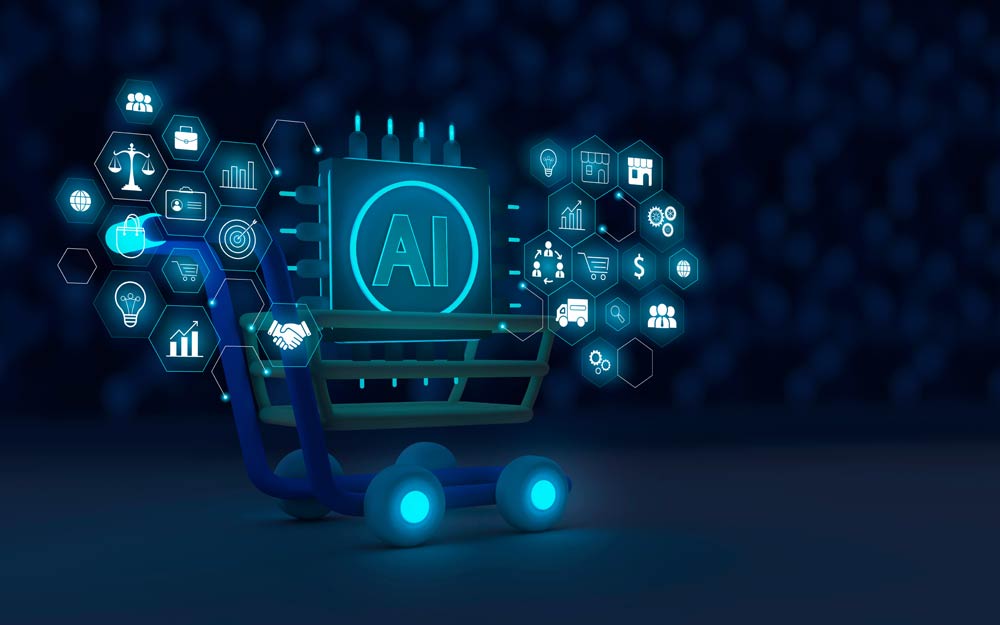
Why AI in E-Commerce is the answer to the next step forward?
AI in E-commerce
Artificial intelligence has made tidal advances within all fields it has touched, this path-breaking technology has taken on the role of a super-intelligent being – and what was once rudimentary and slow is now modern and fast; when you’re dealing with AI integrated tools, efficiency is almost a standard.
Prior to the advent of big technologies, humans performed repetitive tasks time and over, and as is the case with most repetitive tasks; they eventually became habits, creativity was taking a serious hit.
Human innovation was being stemmed with tasks on repeat, albeit at a much higher rate due to increased demand, but it was still the same task caught on loop.
The need-of-the-hour was AI. It was almost necessary for humans. AI broke this habitual trend, artificial intelligence-enabled humans to move away from rudimentary tasks, allowing us to focus on bigger and newer concepts, paving the way for better innovation.
From banking to heavy industry and even something as personal as our homes, the presence of AI is loud and felt now more than ever. Something as ordinary as our phones have some of today’s leading- and cutting-edge AI embedded technology for us on offer.
“Artificial intelligence would be the ultimate version of Google. The ultimate search engine that would understand everything on the web,” – Larry Page, CEO of Alphabet.
Your Everyday Assistant…& More.
The likes of Siri and Googles’ Assistant make it possible for us to find answers to our countless questions through voice commands or even book flight tickets.
Did you know? Your Google Assistant can give you information that’s available for public domain, information regarding available flights and pricing information for future flights using QPX API.
You can easily find information for flights that you’ve already booked while this information is further distilled from information in your Gmail inbox. You can further use these features to additionally review information stored about you through it’s My Activity manager in your Google account.
As we earlier mentioned, technology has come a long way in various industries, affecting our personal and business lives, but perhaps that one industry that’s made a stellar leap and seen a tremendous amount of change has to be the E-commerce industry.
Talking Numbers:
Statista has estimated that 1.92 billion global buyers will participate in e-commerce activities in 2019. The number is expected to rise to more than 2 billion by 2021!
As close as can get. AI in E-commerce.
The use of AI in E-commerce has made it possible for E-commerce brands to get in touch with their shoppers unlike ever before.
That iron veil of unfamiliarity and impersonality has been lifted, we’re looking at birthdays being remembered, anniversaries, Valentine’s Day – you name it; the power of AI in E-commerce has revolutionized the industry.
Let’s look at the E-commerce industry prior to divulging into the AI-powered bit. The concept of shopping was first redefined, and perhaps this allowed the industry to make a significant leap, moving away from legacy practices and solutions.
Our new shopping model was this:
We were to go from walking up to a store, browsing through the products we needed, physically holding them and judging its durability, build and quality to finally purchase the products through physical transactions.
What was tipped to be a colossal fail by most experts ended up being the biggest revolution in terms of shopping! So, it seemed only natural that an industry familiar with huge amounts of disruption could easily take up new technology when everyone else seemed rather apprehensive.
Behind the scenes of AI-Powered E-commerce
There’s a whole lot that goes on behind an online E-commerce portal. Most customers are only the end to that colossal domino effect and a series of solutions implemented for their customers. That outcome translates to customer delight those two words brand such as Amazon love hearing – ‘brand loyalty.
The demand for online brands has caused companies to be a lot more creative and personal when it comes to reaching out to their shoppers.
Bring your cart back to life
Every E-commerce business dreads this problem. How often as a shopper have we added an item to our carts only to get to check out and face a problem. Often, it’s a technical glitch that leads to this problem, most customers never go back trying to pay again, and just like that, you’ve lost yourself a valuable buyer.
Companies today can leverage the power of AI to turn a bad situation around, in no time at all. Following up on these customers is made super easy with the use of AI.
Apart from bringing back customers, automation can also give an E-commerce company valuable information as to why a problem was triggered in the first place. It’s all done simultaneously, reducing the drop off rate of your shoppers significantly.
AI tools & targeted customers
Apart from technical issues; high costs and the requirement to create an account. Understanding the reasons why shoppers are failing to make a purchase allows you to make a purchasing process a lot more efficient, streamlined and transparent.
Based on your online market presence and the kind of tonality your business uses to reach out to its shoppers, AI implemented in your business allows you to target specific shoppers based on levels of interest and shopping history.
The use of AI tools combined with machine learning allows marketers to make informed decisions that equal to a higher conversion rate with their shoppers.
Creating engaging and creative campaigns can only do so much, making sure your campaign reaches its audience and further ensuring it reaches a specific audience is what truly defines your outreach. With over 40% E-commerce traffic coming from organic Google search results, the need for SEO for your E-commerce is vital for its success.
An SEO based AI tool can help your business to:
· Optimize content
· Recommend relevant tags for higher traffic
· Assist your E-commerce business with keywords research
· Guide you when the best time it is for you to publish
· Conduct site performance analysis
It’s more than sounding creative and coming up with the best ad copy, precise keywords, meta descriptions, tags, and sound analysis can help you go a long way.
As an E-commerce business, you’re looking to drive more traffic to your site and influence shoppers to make decisions with organized ad-content.
Get precise, forget about that tried and tested guesswork, SEO-based AI tools can take some of the guesswork out – helping you to select the right keywords, publishing the best content, and understanding how to improve your SEO and business.
Virtual Assistants
Most E-commerce companies consider this the mecca to their AI-powered solution when it comes to doing business in today’s competitive markets.
Modern virtual assistants are fully capable to interact with customers, using highly conversational language, they can extract information from a shopper, in a conversational manner – shoppers don’t even feel like they’re talking to a virtual assistant.
This if further complemented with the implementation of virtual shopping carts that helps build a streamlined and effective process for the customer.
We’ve already talked about how AI is can curate preferences based on a customer’s choices and interests, building an intuitive online shopping experience. Whether it’s North Face’ digital personal shopper that utilizes IBM’s Watson platform to better customer experiences; everyone seems to be implementing AI within their E-commerce, and rightfully so.
The, ‘Does AI Belong in E-commerce’ narrative
According to a report by Narrative Science, it is predicted that 62% of the enterprises will use AI technologies by 2018.
While the proof of the pudding is in the eating, some still seem to think that the hype built around Artificial Intelligence within the realm of E-commerce has almost created a monkey see – monkey do effect; in regard to the digital space.
However other experts also completely ignoring it do your business no good.
There is some truth to initial hesitation over the economic sustainability of AI applications, but it’s still early days and if we’re to go with our gut, the numbers and based on AI’s track record and case history, its uses in various industries, it would almost seem necessary to adopt them.
Read our blog on: 19 Ways an AI-Driven Customer Service Chatbot Improves CS and CX
Discover the Latest Insights on Interactive Intelligence for Banking Newsletter
Join the newsletter to receive the latest updates in your inbox.



